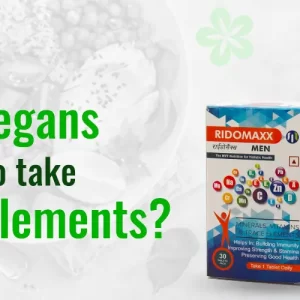A vegan diet may be a good way to make healthier decisions and a well-planned vegan diet is often healthy for individuals all throughout their lifecycle. However, excluding meat and dairy products completely can leave you lacking in specific nutrients and the reality is that, in spite of your eating pattern, you should be conscious of getting all the nutrients your body needs.
You can get a number of these nutrients if you’re consuming a varied vegan diet with various pulses, vegetables, and grains. However, to get the proper amount of nutrients for optimal health, supplementing with the proper vitamins may be a good choice. This means that learning the basics of nutrition and paying attention to your body can help support your overall well-being and reduce the danger of nutrition-related health problems. Therefore that’s what we’re progressing to talk about today!
Let’s look into the most common nutrients that a vegan diet may lack.
Calcium:
Calcium is another very important nutrient that some vegans may be lacking. It plays a crucial role in the formation of teeth and bone, heart health, and muscle performance. Some research shows that vegans have low calcium levels when compared to others. Here are a few plant foods that are rich in calcium:
- Leafy greens like mustard greens, watercress, and bok choy
- Legumes
- Fortified foods that include different types of plant-based milk.
If an individual isn’t obtaining enough calcium they must consult a nutritionist for calcium supplements. Taking vitamin D along with calcium might help in better absorption.
Vitamin B12:
Omnivorous diets usually contain enough B12 to fulfill most people’s needs. As vegan diets completely cut out on animal products, vitamin B12 deficiencies could occur. Vitamin B12 helps with maintaining a healthy nervous system and the growth of healthy red blood cells. We should also know that every individual absorbs the nutrition in their body differently. Even those who eat meat may have a vitamin B-12 deficiency if their body is unable to soak up the nutrition properly. The body’s ability to use vitamin B-12 drastically declines with age. Individuals who don’t consume animal products might need to acquire B12 from fortified foods or supplementation. The latter choice may be an easy way of ensuring that you get an adequate amount of Vitamin B12 for your body.
Iodine
Iodine is important for the thyroid gland to operate and also helps to manage how energy is produced and utilized in the body. The quantity of iodine a plant has depends on the soil iodine level it is grown in. If the plants are grown nearer to the ocean then they have a good iodine level, thus becoming a good plant food for vegans, but there is no guarantee. Seaweeds are a good source of iodine as they grow in ocean water. Iodized salt also is a very common and great source of iodine that can be used in preparing daily home meals. As an alternative, a supplement containing potassium iodide, like Ridomaxx, could be a reliable option.
Vitamin D:
Vitamin D helps improve immune system performance. It also helps the body with the absorption of different nutrients, like calcium and phosphorus. People can get an ample quantity of vitamin D on a daily basis by spending some time in sunlight (nearly 15 – 20 minutes). But many people live in areas with cloudy weather, and cold. People also cover up their skin most of the time to avoid tan or sunburns. Dairy products like milk and yogurt are good sources of Vitamin D, however, these foods aren’t appropriate for vegans. Vitamin D vegan sources include a few kinds of mushrooms and fortified cereals. Even after all of this the common vitamin D intake from food alone tends to be under the suggested daily intake, thus people can often benefit from taking a supplement.
Conclusion:
A well-planned healthy vegan diet gives you nearly everything you need, with just a little help from nutritional supplements you can fulfill your body’s nutritional requirements. We recommend you to check out Ridomaxx multivitamins that has 24 scientifically proven nutrients that your body needs in one tablet.




